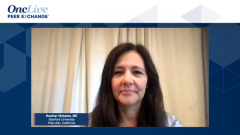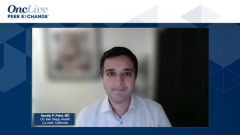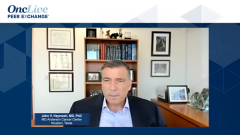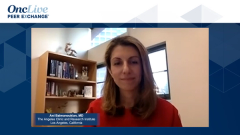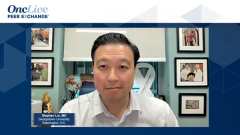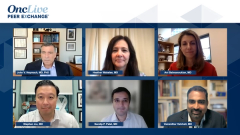
Sequencing Treatments in EGFR-Mutant NSCLC
Vamsidhar Velcheti, MD, and Stephen Liu, MD, discuss their treatment approaches for patients with EGFR-mutant NSCLC who progress on osimertinib.
Episodes in this series

John V. Heymach, MD, PhD: Vamsi, for patients, we know that eventually they do unfortunately progress on our best drugs, including osimertinib [Tagrisso] What are you doing after that?
Vamsidhar Velcheti, MD: I think that’s a space where our practice is really, because it’s a lot of clinical scenarios that actually fall on what systemic therapy should be used there. Some of it is dictated by the disease burden and location of mets [metastasis], like especially CNS [central nervous system] mets. I know there’s a lot of controversy around continuation of osimertinib beyond progression with chemotherapy. We had VEGF [vascular endothelial growth factor] inhibitor, as you probably saw from all of our colleagues discussing this in the past, we have a very high range of practice patterns there post progression. What do I do in my practice? I generally try to avoid using PD-1 [programmed cell death protein 1] combination. I tend to use platinum pemetrexed with or without VEGF inhibitor and I do continue osimertinib, especially in patients who have CNS mets. But I know there are several colleagues who use this approach.
John V. Heymach, MD, PhD: You mentioned continuing osimertinib. Shinen Lin in our group did an analysis, and I think it really surprised us, that after patients had their first progression on osimertinib, if we consolidated with radiation, the second progression was actually over a year, it was 12.8 months. Now that’s not a randomized prospective study. That’s a retrospective analysis and I have to say we know that there are caveats in terms of patient selection, but still for patients we selected, which was a lot, that did seem like an option. What’s your practice there at first progression on osimertinib? Do you think about consolidating with radiation or ablative therapy and continuing?
Vamsidhar Velcheti, MD: That’s a very good point, John. Often, if it’s a very limited progression, if it’s an oligoprogressive disease, there are different patterns of progression on osimertinib. It really depends on the extent of the disease burden and measure of progression. Going back to Heather’s point about benefit of chemotherapy, and I’m actually really looking forward to seeing the FLAURA2 study data. I’m not sure when that’s going to read out. But I think we’ve come a long way in terms of disease monitoring as well. I think we have...differently in terms of how we kind of design these trials. I kind of wonder if we perhaps shouldn’t be treating with chemotherapy/osimertinib up front, but however, there may be some speed point, maybe at maximal response like for persisters. I know, John, you’ve done a lot of work in that space. Perhaps identifying a point where we can introduce chemotherapy sooner might be a way to go here.
John V. Heymach, MD, PhD: Yes. Very interesting. Stephen, what’s your practice for osimertinib progressors here? Let’s say that they can’t be consolidated with radiation.
Stephen Liu, MD: Certainly, I agree that there’s all kinds of progression, and what we’ve learned over time is not to throw the baby out with the bath water, that osimertinib is still doing a large role in many of these patients. In some cases, we’ll tolerate a little bit of progression in some areas. Maybe we don’t need to so quickly move on to the next thing. But we’re strong believers in biopsy, not just to characterize resistance and identify actionable mechanisms of resistance but also to be sure there’s not histologic transformation, something that’s probably under reported, both small cell and squamous cell. Thus, we’ll send out for liquid biopsy, do a tissue biopsy. And I would agree with my colleagues that the standard is chemotherapy, and we don’t know if we have to continue the OSI [osimertinib] or not. The COMPEL [Chemotherapy Plus Osimertinib Against Chemotherapy Plus Placebo in Patients With Non-small Cell Lung Cancer (NSCLC)] trial will give us some insight, but I will say that it has been my practice, despite the negative IMPRESS [Gefitinib Plus Chemotherapy Versus Chemotherapy in Epidermal Growth Factor Receptor Mutation-Positive Non-Small-Cell Lung Cancer Resistant to First-Line Gefitinib] trial, to continue OSI [osimertinib] if patients have a history of brain metastases.
John V. Heymach, MD, PhD: Right. It’s a great point.
Transcript Edited for Clarity


